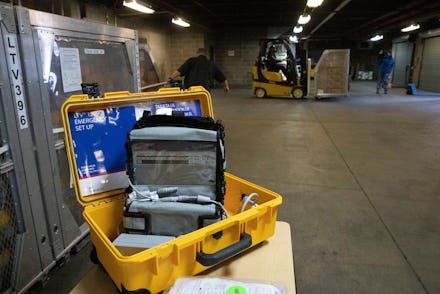Trump's free-market coronavirus response has failed completely

If there’s one thing that’s been missing from the Trump administration’s approach to providing essential medical gear to the country in this time of crisis, it’s clarity. For the past few weeks, as governors have begged the administration to treat the coronavirus threat seriously and do everything in its power to increase the production of ventilators, masks, and respirators, the administration has dithered. On March 6, President Trump claimed that “anybody that needs a test gets a test,” even as medical officials across the country complained that they couldn’t get their hands on the limited test kits available.
Trump further ignored pleas from governors to invoke the Korean War-era Defense Production Act, which gives the federal government the authority to requisition manufacturing facilities to produce essential gear. He signed the bill last week, but declined to use it immediately to directly boost the nation’s production of essential health care equipment.
Instead, he’s squandered valuable weeks squabbling with critical governors like New York’s Andrew Cuomo, who has begged for more federal guidance and aid. "Respirators, ventilators, all of the equipment — try getting it yourselves," Trump told the nation’s governors last week, according to The New York Times. "We will be backing you, but try getting it yourselves. Points of sales, much better, much more direct if you can get it yourself."
Over the weekend, Trump claimed that big corporations will pick up the slack to meet the nation’s medical needs. “We have tremendous numbers of companies also making equipment,” he said at a press conference at the White House on Sunday. He mentioned companies including Baxter and GE Healthcare, and argued that they would be able to produce enough equipment to weather the crisis. He even invoked the familiar right-wing bugaboo of Venezuelan socialism to argue that the government should stay out of business. “We’re a country not based on nationalizing our business,” he said. “Call a person over in Venezuela; ask them how did nationalization of their businesses work out. Not too well. The concept of nationalizing our business is not a good concept.”
Since then, as ventilator shortages have loomed ever closer, and hospitals in hotspots like New York brace for a tidal wave of severe cases, the president has continued to resist using DPA. Despite the president's apparent certainty that it would happen, his insistence that the market would, on its own, correct for this health issue turned out to be bogus. His free-market response to coronavirus failed.
On Monday, he claimed that the notion of invoking the DPA “sent tremors through our business community and through our country” because “you're going to nationalize an industry.”
The government’s equipment production program amounts to a belated use of the DPA, in limited circumstances and supplemented by a patchwork of corporate efforts to manufacture supplies.
In fact, the DPA would not nationalize any industries. It would simply allow the government to temporarily redirect how companies allocate resources and what they produce. The companies would still be paid for their efforts and ownership would not transfer to the government.
Cuomo responded to Trump saying as much, clarifying that the DPA “does not nationalize any industry” and that businesses merely volunteering to produce equipment would not be sufficient to meet the scale of the crisis. “It can’t just be, ‘Hey who wants to help? Let me know,’” Cuomo said. “We need to know the numbers of what we need to produce and who is going to produce that and when.”
Cuomo went on to describe how, without federal control of the manufacturing and sales process, states are forced to bid against each other and drive up the price of goods. He noted that masks which formerly cost $0.85 now sell for $7 each.
He again urged the government to use all available authority to create supplies. “We need the product now,” he said. “We have cries from hospitals around the state. I have spoken to other governors across the country. They have the same situation. They need these materials now and only the federal government can make that happen.”
Finally, on Tuesday, the federal government announced that it would invoke the DPA. “So, just a little while ago my team came in, and we're actually going to use the DPA for the first time today,” Peter Gaynor, the head of the Federal Emergency Management Agency, said on CNN. He explained that the law would be invoked to spur the production of 60,000 coronavirus test kits, each of which can provide between 300 and 400 tests. So-called “DPA language” will also be inserted into the contracts for the government’s order of 500 million face masks.
There was no indication, however, that the law will be used to produce more desperately needed ventilator machines.
For now, the government’s equipment production program amounts to a belated use of the DPA, in limited circumstances and supplemented by a patchwork of corporate efforts to manufacture supplies. Ford Motor Company announced that it would partner with 3M to make respirators and with GM to make ventilators, while also making masks in-house using 3D printing.
“We’re doing it on our own,” Bill Ford, the company’s CEO, told NBC News. “Obviously the White House has put a call out for companies to help, but frankly we were doing this, getting all this in motion before that.”
Other companies have chipped in as well. Tesla purchased over 1,000 ventilators from overseas and delivered them to Los Angeles on Monday — an instance of combined spending and benevolence, rather than the mystical emergency production Trump seemed to think might begin out of thin air. Whether corporate benefactors will be able to fill the yawning gap without increased direction from the federal government remains to be seen.